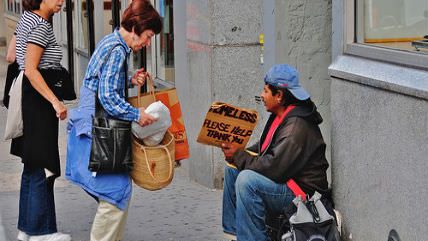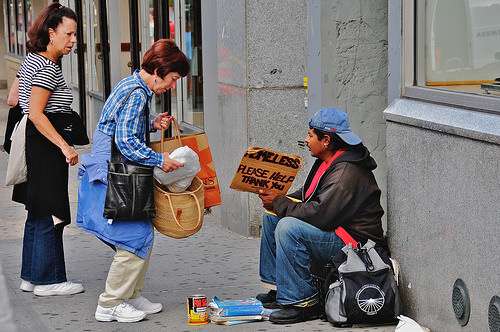Los Angeles Considers Ban on Publicly Feeding Homeless People

Despite government agencies, such as the Los Angeles Homeless Services Authority, spending $82 million per year to help the city's homeless, Los Angeles has the second-highest homeless population in the country at 53,800 individuals.

So to help mitigate the problem, organizations like the Greater West Hollywood Food Coalition serve nightly hot meals to long lines of hungry residents in mobile food trucks parked at various parts of the city. The GWHFC, which has been operating for 27 years staffed by volunteers, prides itself on providing up to 200 meals per night, as well as offering emotional support and "specific, practical help" to its patrons when possible. Their motto is "I Am My Brother's Keeper."
Not everyone is pleased with the charity's presence though.
Two members of the Los Angeles City Council recently proposed an ordinance that would ban private charities and individuals from feeding homeless people in public. The politicians behind the legislation, Tom LaBonge and Mitch O'Farrell (both Democrats), have said they are responding to concerns from residents who are uncomfortable with the homeless spending lots of time around their homes.
One such resident, Alexander Polinsky, an actor who lives two blocks from the popular bread line, told the New York Times:
If you give out free food on the street with no other services to deal with the collateral damage, you get hundreds of people beginning to squat. They are living in my bushes and they are living in my next door neighbor's crawl spaces. We have a neighborhood which now seems like a mental ward.
Essentially, Councilman LaBonge argued, the charitable food line is creating a public nuisance. "[It] has overwhelmed what is a residential neighborhood," he told the Times. "When dinner is served, everybody comes and it's kind of a free-for-all."
Opponents of the ban have expressed their frustration at what they consider heartless, overreaching legislation.
"This is an attempt to make difficult problems disappear," Jerry Jones, the executive director of the National Coalition for the Homeless told the Times, adding, "It's both callous and ineffective."
Debra Morris, a patron of the Greater West Hollywood Food Coalition, said that the organization is "helping human beings," as she was seated in a wheelchair enjoying the evening's offering of pasta with tomato sauce. "I can barely pay my own rent."
If Los Angeles enacts the ordinance, the Times reports, it will join more than 30 other cities "that have adopted or debated some form of legislation intended to restrict the public feeding of the homeless." Last year for instance, Mayor Bloomberg banned food donations to the homeless in New York City on the grounds that the city couldn't assess the food's salt, fat, and fiber content. In Orlando, Florida, police have arrested volunteers feeding homeless people in parks for violating a city ordinance. The National Coalition for the Homeless calls the trend the "criminalization of homelessness in U.S. cities."
In the Atlantic Cities, Emily Badger writes:
These laws…look like attempts to push the homeless out of public view. If a city can't get rid of these people, in other words, maybe it can get rid of the activities that so visibly attract them.
If the purpose of the legislation is to reduce the presence of homeless people in public though, then why don't cities ban homelessness outright? It turns out that politicians actually tried just that in Los Angeles in the early 2000's. The city passed an ordinance that made it illegal to sleep on the street. However, a judge eventually overturned it as unconstitutional.


Show Comments (45)